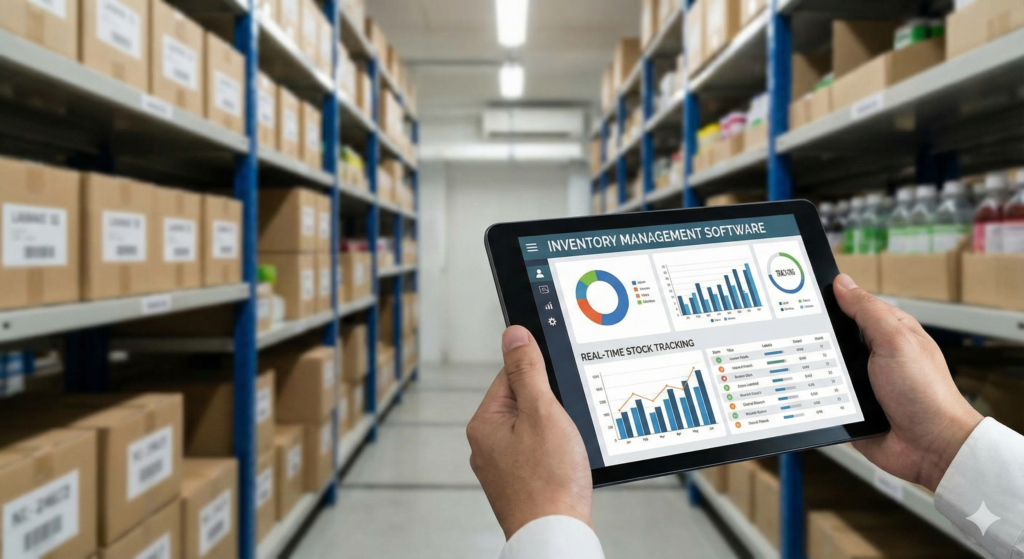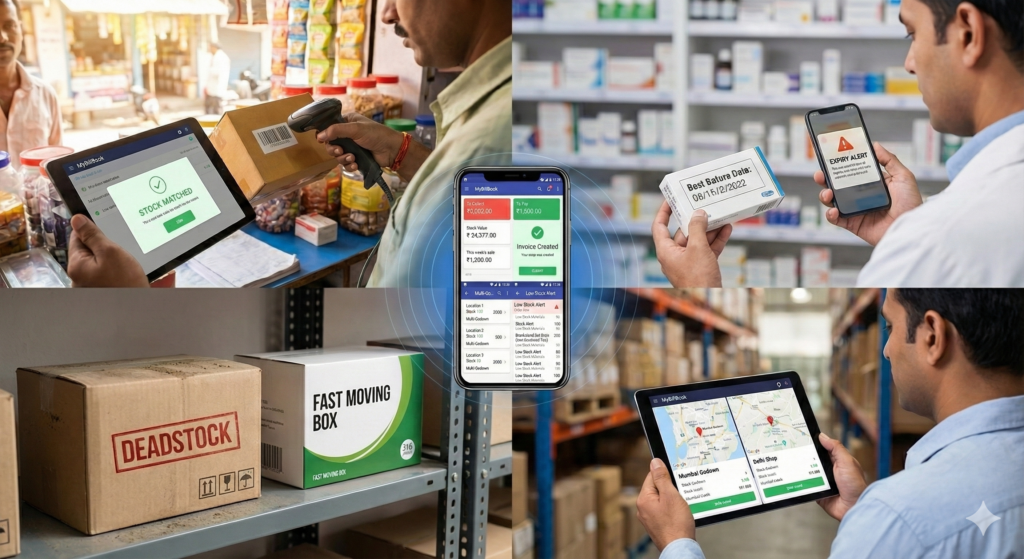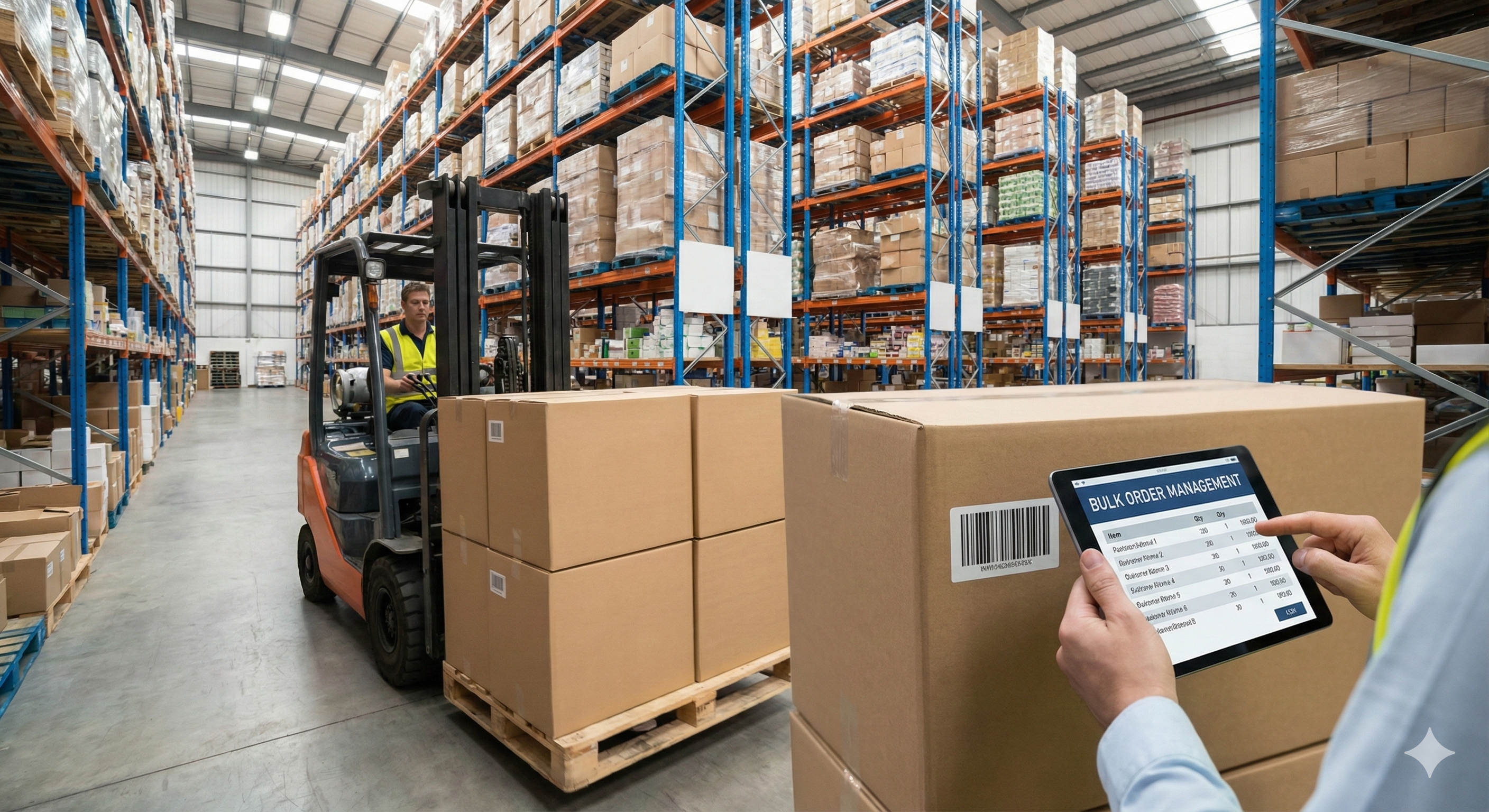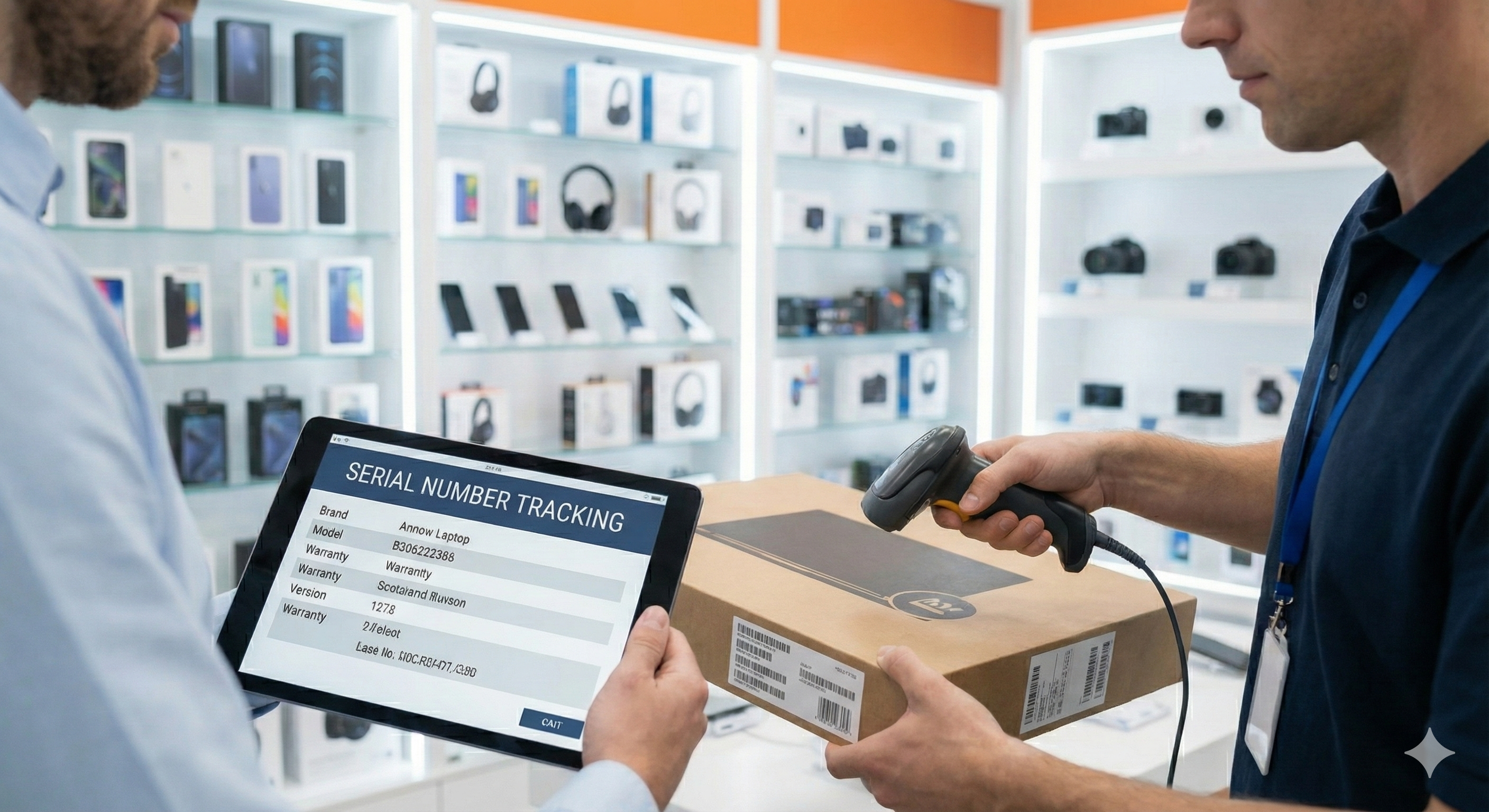The #1 Smart Inventory Management Software for Indian Businesses
Take complete control of your stock with real-time visibility, accurate tracking, and GST-ready workflows. Manage thousands of SKUs across multiple godowns — all from one simple, reliable platform.
Trusted by 1 Crore+ Businesses

What Is Inventory Management Software?
Inventory management software is a system that helps businesses track, control, and optimize stock across purchases, sales, transfers, and returns — in real time. When integrated with retail billing software, it eliminates the need for manual registers or spreadsheets by automatically updating stock levels whenever inventory moves. This ensures businesses maintain accurate, up-to-date information, improving efficiency and reducing errors in the process.

Why Inventory Management Is Critical For Every Business
Without a proper inventory system, businesses face invisible losses that impact profitability
⇒ Frequent stockouts of fast-moving items
⇒ Excess capital blocked in slow-moving stock
⇒ Mismatch between physical stock and records
⇒ Excess capital blocked in slow-moving stock
⇒ Manual errors during audits and compliance
⇒ Poor visibility across multiple godowns
⇒ Difficulty in GST compliance and reporting
The Three Pillars of Professional Inventory Control
Before choosing any inventory tool, understand the foundations of modern stock management.
Why Indian Businesses Are Switching to myBillBook
As businesses grow, managing inventory on registers or basic spreadsheets leads to hidden inefficiencies. myBillBook helps solve the most common inventory challenges faced by Indian businesses.

Advanced Inventory Features Offered by myBillBook
Everything you need to manage complex inventory operations at scale
Multi-Godown & Warehouse Management
Manage inventory across multiple locations with complete clarity.
- Transfer stock between godowns with a single entry
- View location-wise stock availability instantly
- Ideal for distributors and multi-branch businesses
Serial Number & IMEI Tracking
Designed for electronics, mobile, and hardware businesses.
- Track each unit using unique serial or IMEI numbers
- Maintain warranty and sales history
- Prevent errors by scanning serial numbers at billing
Batch-Wise Tracking & FEFO Management
Essential for pharma, FMCG, and regulated goods.
- Track items by batch and expiry date
- FEFO (First-Expiry-First-Out) suggestions reduce wastage
- Batch-level stock and expiry reports
Automated Low-Stock Alerts
Never lose sales due to stock shortages.
- Set reorder levels for every item
- Get instant alerts via WhatsApp & Dashboard
- Act before inventory becomes critical
Set Up Your Inventory in 3 Simple Steps
Getting started with myBillBook is quick and seamless - For both new & other billing software users
Inventory Management for Different Business Types

Track medicines batch-wise with expiry monitoring. Use expiry reports to return near-expiry stock and maintain regulatory compliance.

Manage bulk inventory across multiple warehouses. Track inter-state stock movement and handle large SKU volumes efficiently.

Track high-value inventory using serial and IMEI numbers. View complete unit-level sales and warranty history.

Handle fast-moving goods with barcode scanning, multi-unit management, and accurate stock conversion.
Why Choose myBillBook for Inventory Management?
myBillBook combines inventory management with everyday business operations — so managing stock becomes effortless, not an extra task.
✅ Simple, mobile-first interface with powerful controls
✅ Accurate real-time inventory tracking
✅ Supports complex use cases like batch, serial, and multi-godown
✅ Secure, cloud-based platform with reliable support
✅ GST-ready workflows and compliance
See How Real Businesses Manage Inventory with myBillBook
Pricing plans
Diamond Plan
₹217
Per month. Billed annually. Excl. GST @18%
✅ Create unlimited invoices
✅ Add up to 1 business + 1 user
✅ Inventory management
✅ App + Web support
✅ Priority customer support
✅ GSTR reports in JSON format Popular
Platinum Plan
₹250
Per month. Billed annually. Excl. GST @18%
Everything on Diamond Plan +
✅ Add up to 2 business + 2 user
✅ 50 e-Way bills/year
✅ Staff attendance + payroll
✅ Godown management
✅ Whatsapp and SMS marketing Popular
Enterprise Plan
₹417
Per month. Billed annually. Excl. GST @18%
Everything on Platinum Plan +
✅ Custom invoice themes
✅ Create your online store
✅ Generate and print barcode
✅ POS billing on desktop app
✅ Unlimited e-Invoices & e-Way bills
Inventory Management, Backed by Powerful Billing
Inventory works best when it’s connected to everything around it. myBillBook goes beyond stock management to support daily operations without forcing businesses to use multiple different tools.
Smart Billing That Keeps Inventory Accurate
Every sale and purchase updates inventory automatically, ensuring stock levels stay accurate without manual adjustments or reconciliation work.
Accounting That Aligns With Stock Movement
Purchases, sales, and stock valuation stay linked, making audits easier and giving clarity on how inventory impacts finances.
GST-Ready Workflows for Indian Businesses
Create GST-compliant invoices and reports while keeping inventory data structured, traceable, and aligned with Indian regulations.
Customer & Supplier Records in One Place
Track party-wise purchase history, sales, and outstanding balances, all directly connected to inventory movement.
Payment Tracking That Closes the Loop
Track paid, partial, and pending invoices with clear visibility, helping businesses follow up faster and keep cash flow predictable.
Reports That Combine Stock and Business Insights
View reports that connect inventory data with profitability, cash flow, and overall business performance.
Frequently Asked Questions
What is the difference between inventory management and stock management?
Stock management focuses on quantity, while inventory management includes tracking, valuation, movement, and optimization.
Can I manage inventory across multiple godowns?
Yes, myBillBook supports multi-location inventory with centralized visibility.
Does myBillBook support batch and expiry tracking?
Yes, batch-wise and expiry tracking are available for applicable businesses.
Is inventory updated automatically?
Inventory updates automatically with every sale, purchase, or return.
Can I access inventory data on mobile?
Yes, inventory data is synced and accessible across mobile and desktop devices.
When should a business switch from manual inventory tracking to software?
When stock mismatches, frequent stockouts, expiry losses, or multi-location complexity start impacting daily operations and profitability.
Know more about Billing & Accounting Software for Small Businesses
Retail Inventory Management Software
Real Estate Billing and Accounting Software
Department Store Billing Software
Ecommerce Inventory Management Software
Travel Agency Accounting Software
Restaurant Inventory Management Software
Construction Accounting Software
